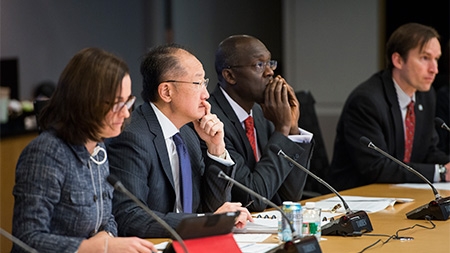President Kim showed his solidarity with those countries deeply impacted by the Ebola epidemic. He gave his condolences, stating “The world was woefully unprepared for this epidemic.” He noted that, even though the outbreak and number of cases has decreased significantly, “We must keep focus until we get to zero cases.” President Kim placed emphasis on building robust health systems, as it is a multiple-win approach; “We cannot simply focus on disease surveillance. Effective health care has to follow.” Finally, President Kim proposed a Pandemic Emergency Facility between donors and development partners to provide a “source of funding to be dispersed immediately. Not in 8 months, but 8 hours.” He was optimistic that the fight against epidemics such as Ebola can improve health systems, economic prospects, and multilateral cooperation in mobilizing public and private funds to “come up with a response equal to the challenge.”
Intervention
The members of parliament all gave stunning testimony of the lessons-learned from the Ebola outbreak. Several realities were highlighted in the instances of those countries affected negatively from the epidemic. First, already fragile health systems were destroyed (Peter Coleman, MP Liberia). Second, traditions of local populations were detrimental in failing to isolate Ebola (Aboubacar Sylla, MP Guinea). Finally, the outbreak of Ebola caused huge economic travesty (Patricia Brown, MP Sierra Leone), all of which culminated in a stigma for these countries relying on tourism and outside financial assistance to promote and sustain high-trajectory and sustainable growth patterns.
MPs from Mali and Senegal also gave input as countries which succeeded in containing Ebola quickly. The outreach of political leaders to react quickly (the President of Mali openly declared a “War Against Ebola,” according to MP Guédiouma Sanogo) and manage resources played a crucial role in eliminating Ebola in Mali as of 18 January 2015. Further, an all-encompassing Epidemic Management Plan in Senegal, led by the Minister of Health (a specialist in infectious diseases), strategically responded to Ebola by vocalizing and utilizing resources to: “psychologically prepare doctors” (Mansour Sy Djamil, Deputy Speaker of Senegalese Parliament); control the national borders; strengthen structural capacity; and inform citizens of detrimental cultural practices which would clearly obviate the destructive nature of Ebola.
“You (MPs) are at the nexus between central and local government” –
Makhtar Diop, Vice President for Africa, World Bank Group
Mr. Diop continued by saying in the past, vertical diseases shaped the global health discussion, but that advocacy must be done to create strong health care systems. Additionally, Tim Evans, Senior Director for Health Nutrition and Population Global Practice at the World Bank Group, noted the crucial nature of health systems which are universally accessible. Further, having well-paid and safe healthcare workers will not only create employment opportunities in these countries, but also advance health infrastructure in a positive fashion for years to come. As MP from Sierra Leone Helen Kuyembeh said, “The best money spent is for local people at a grassroots level.” Outreach and leadership can be catalysts for preventing outbreaks of this nature; as Head of the Finance and Budget Committee in Guinea, Ousmane Kaba, explained “MPs are in direct communication with local populations.” He also praised the World Bank’s rapid disbursement of funds, and encouraged further development future project implementation. As the meeting ended, Chair of the Parliamentary Network Jeremy Lefroy reiterated the words of President Jim Yong Kim: “We must get to zero cases. MPs can outreach and have a huge role to play in the future.” Such requires political will, as the Members from the PN are committed to join the coalition to deliver the response equal to the challenge.


